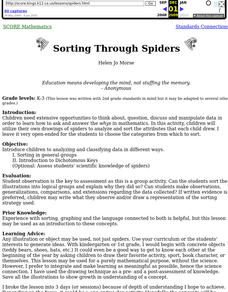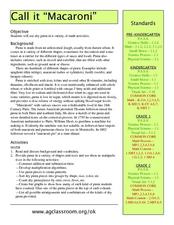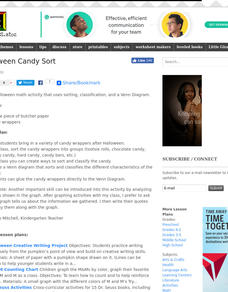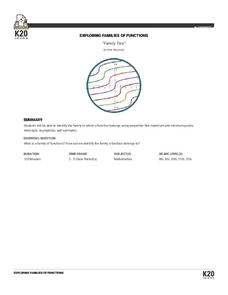Curated OER
Sorting Through Spiders
Students utilize their own drawings of spiders to analyze and sort the attributes that each student drew.
Curated OER
Sort by Own Rule
In this sorting activity, students examine pictures of clothing items such as a jacket, sneakers, pants and shorts. They decide on a sorting rule before coloring the item blue that go in one group and coloring the other items green. They...
Curated OER
Math Mouth!
Students examine and discuss math vocabulary. They participate in various games involving the math vocabulary. Use this as a supplement.
Curated OER
Sorting and Classifying
Fifth graders are engaged in sorting and classifying geometric shapes of various colors and sizes. They discuss the properties of these shapes and illustrate a range of classifications using Venn diagrams.
Curated OER
Popcorn Math
Everyone loves popcorn! Use this treat to teach math concepts including place value, estimating, graphing, and volume. Eight possible activities are included, and they can be modified to fit all grade levels.
Curated OER
Math: Matching Rods and Religion
Math and religious studies are integrated together using using cuisenaire rods and Kid Pix for this problem-solving exercise. In pairs, they match different colored rods to represent various groups of people. Meanwhile, young scholars at...
Curated OER
Sorting Through Life!
Students sort and count objects. For this sorting skills lesson, students work in small group with various objects that can be sorted and counted in groups.
Curated OER
Rainbow Fish: The Copycat Fish Lesson Plan
Students explore the concept of copying one another. In this early childhood lesson plan, students discuss what a copycat is and why people copy one another. Students then discuss the story Rainbow Fish: The Copycat Fish, recording...
Curated OER
Rule It Out
Here's a way to create math fact flash cards! Learners create their own cards and sort them into matching categories. Students start with addition and work their way up to harder math such as multiplication, and are asked to notice...
Curated OER
Call it "Macaroni"
Who knew there were so many fun educational opportunities featuring pasta? Scholars read a brief informational text about the history of pasta (note that "macaroni" is spelled two different ways, so address this if kids are reading...
American Statistical Association
Armspans
Young mathematicians collect data on the arm spans of classmates. Then they sort the data by measures of center, spread, and standard deviation. Finally, they compare groups, such as boys and girls, to interpret any differences.
Little Bit Studio
Bugs and Buttons 2
Playing with bugs and buttons has never been so much fun! Offering a variety of different activities, this is a great resource for developing basic skills in preschool and kindergarten-aged children.
West Contra Costa Unified School District
Properties of Multiplication
Unlock the keys to fluent multiplication with this upper-elementary math lesson. After an introduction to the five properties of multiplication, young scholars match cards with different math problems to posters describing each...
EngageNY
Real-World Positive and Negative Numbers and Zero
Class members investigate how positive and negative numbers are useful in the real world. Individuals first read a short passage and identify terms indicating positive and negative numbers. They consider situations involving positive...
Curated OER
Classification
Learners investigate how different types of food can be classified then counted. In this sorting, arranging, and classifying lesson plan, students explore how to group foods based on commonalities. Learners are asked four questions which...
Curated OER
Identify, Sort, Classify
Students identify, sort, and classify. In this kindergarten math lesson, students explore visual examples of sorting with 1 or more attributes. Students also practice solving problems that their instructors model.
Curated OER
Classifying and Sorting Shapes 3
For this early childhood problem solving worksheet, students sort and classify shapes as they respond to 3 short answer questions regarding characteristics of shapes. Students also respond to 1 test prep question.
Curated OER
Halloween Candy Sort
Students use their Halloween candy to practice sorting and classifying. They compete a Venn diagram comparing their candy wrappers. They develop ways as a class to catorgize the candy in different ways.
Curated OER
Junk Sort
Students analyze objects by one or more attributes. In this sorting lesson, students use manipulatives and string or yarn to create a sorting game. Students read books and items from the classroom to sort.
Curated OER
Sorting and Analyzing
Students explore sorting and graphing. In this math lesson, students create and analyze a class bar graph about their birthday months. They then estimate and sort candies to make and analyze their own bar graph.
Curated OER
Sorting And Classifying Numbers
For this recognizing a characteristic of numbers worksheet, learners sort and classify numbers into two groups. Students solve 12 problems.
K20 LEARN
Family Ties: Exploring Families OF Functions
They say it runs in the family. Small groups use a card sorting activity to group graphs of functions into families. After grouping by families, the class develops conclusions for parent functions and create a graphic organizer.
West Contra Costa Unified School District
Graphing Linear Inequalities Sort
Learners first determine the slope-intercept and standard forms of inequalities given graphs, and then determine key features of the graphs.
CK-12 Foundation
Polynomials and Factoring: Classification Table
It all depends upon the terms. Pupils use the interactive table to sort polynomials. The scholars determine the names for the types of polynomials based on the number of terms.

























